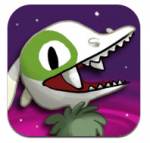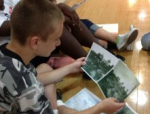Community Embraces New Word Game at Mid-Year Play Day This past Sunday, families at Takoma Park’s Seventh Annual Mid-Year Play Day had the opportunity to experience OtherWordly for the first time. Our educational language game drew curious children and parents to our table throughout the afternoon. Words in Space Several children gathered around our iPads […]
Read moreAuthor: IDEA
What is fan fiction?
June 5th, 2013 by IDEA
 Who owns art and culture? Does it belong to the artist? The legal property owner? Or the society that loves and appreciates it? Traditionally, old art is considered public, and new art is copyrighted. Anyone can write a new twist on Romeo and Juliet, or mashup the Mona Lisa with a mustache. But what if Harry Potter opened a lemonade stand? Or Luke Skywalker had a twin bother? (more…)
Who owns art and culture? Does it belong to the artist? The legal property owner? Or the society that loves and appreciates it? Traditionally, old art is considered public, and new art is copyrighted. Anyone can write a new twist on Romeo and Juliet, or mashup the Mona Lisa with a mustache. But what if Harry Potter opened a lemonade stand? Or Luke Skywalker had a twin bother? (more…)
 Online courses with very large enrollments have rapidly matured in the last two years, led largely by experiments outside mainstream academia by Coursera, Udacity and edX. Ambitious educators, technologists, and funders have created courses on diverse topics, and over five million students worldwide have registered for classes. And 3% have completed the courses. What can we learn? (more…)
Online courses with very large enrollments have rapidly matured in the last two years, led largely by experiments outside mainstream academia by Coursera, Udacity and edX. Ambitious educators, technologists, and funders have created courses on diverse topics, and over five million students worldwide have registered for classes. And 3% have completed the courses. What can we learn? (more…)
 Crowdsourcing means involving a lot of people in small pieces of a project. In educational and nonprofit outreach, crowdsourcing is a form of engagement, such as participating in an online course, collecting photos of butterflies for a citizen-science project, uploading old photos for a community history project, deciphering sentences from old scanned manuscripts, playing protein folding games to help scientists discover new ways to fight diseases, or participating in online discussions. (more…)
Crowdsourcing means involving a lot of people in small pieces of a project. In educational and nonprofit outreach, crowdsourcing is a form of engagement, such as participating in an online course, collecting photos of butterflies for a citizen-science project, uploading old photos for a community history project, deciphering sentences from old scanned manuscripts, playing protein folding games to help scientists discover new ways to fight diseases, or participating in online discussions. (more…)
 The Grand Canyon is yet another place that Google brings to your digital screens, from their Street View family of content. Google has been collecting street-level views of our world at a vast scale possible only because of it’s deep pockets and technical expertise. (more…)
The Grand Canyon is yet another place that Google brings to your digital screens, from their Street View family of content. Google has been collecting street-level views of our world at a vast scale possible only because of it’s deep pockets and technical expertise. (more…)
 In the era of tablets and smart phones, parents of small children may consider educational apps. Recently, the “Slashdot” online community discussed apps and kids. Nerdy parents chimed in with suggestions. This tech-savvy community is often reluctant to rely on apps, favoring “play time outside with soccer and baseballs, and inside with blocks, Hot Wheels, PlayDoh, etc.” But many parents found value in apps, at least occasionally.
In the era of tablets and smart phones, parents of small children may consider educational apps. Recently, the “Slashdot” online community discussed apps and kids. Nerdy parents chimed in with suggestions. This tech-savvy community is often reluctant to rely on apps, favoring “play time outside with soccer and baseballs, and inside with blocks, Hot Wheels, PlayDoh, etc.” But many parents found value in apps, at least occasionally.
Here’s a list of ten apps that computer nerds turn to when they want to engage their young kids in math and science… (more…)
 Sciences and history can nicely meet at historical sites. It engages the history-minded in science, and the science-minded in history. Two examples were recently discussed by Chris Shires, director of interpretation and programs at the Edsel & Eleanor Ford House. (more…)
Sciences and history can nicely meet at historical sites. It engages the history-minded in science, and the science-minded in history. Two examples were recently discussed by Chris Shires, director of interpretation and programs at the Edsel & Eleanor Ford House. (more…)
 Imploded by the same forces that have disrupted the broader publishing industry, the dictionary business struggles to get a grip on the online/mobile world. “Our research tells us that most people today get their reference information via their computer, tablet, or phone” said Stephen Bullon, Macmillan Education’s Publisher for Dictionaries, “and the message is clear and unambiguous: the future of the dictionary is digital.” (more…)
Imploded by the same forces that have disrupted the broader publishing industry, the dictionary business struggles to get a grip on the online/mobile world. “Our research tells us that most people today get their reference information via their computer, tablet, or phone” said Stephen Bullon, Macmillan Education’s Publisher for Dictionaries, “and the message is clear and unambiguous: the future of the dictionary is digital.” (more…)
 Too many books? Valuable books? If you or your organization has a library of too many books, consider selling them using Amazon.com fulfillment services. Unlike using eBay or the Amazon ‘Marketplace,’ in exchange for various fees, Amazon handles everything: they pick, pack, ship, and provide customer service for your products. No wasting staff time, or rushing to pack up a book and run to the post office every time someone places an order. Here are step-by-step instructions on how to do it… (more…)
Too many books? Valuable books? If you or your organization has a library of too many books, consider selling them using Amazon.com fulfillment services. Unlike using eBay or the Amazon ‘Marketplace,’ in exchange for various fees, Amazon handles everything: they pick, pack, ship, and provide customer service for your products. No wasting staff time, or rushing to pack up a book and run to the post office every time someone places an order. Here are step-by-step instructions on how to do it… (more…)


 NASA redesigned
NASA redesigned